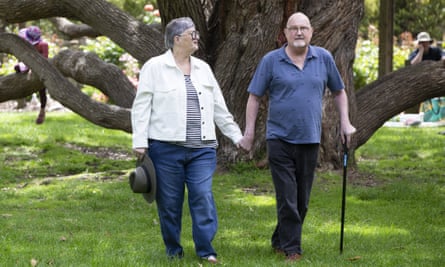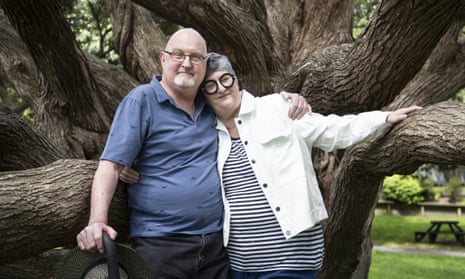When Steve Smith dies, he wants to be at home, in the arms of his beloved wife. He wants it to be a moment he chooses, before the aggressive tumour in his brain takes hold. He may get his wish.
Smith, who was diagnosed with glioblastoma in May, might be the first New Zealander to become eligible for a medically assisted death, after the country’s End of Life Choice law came into force this week.
The legalisation of assisted dying in New Zealand has been the culmination of years of activism. Perhaps most prominent of the campaigners was Lecretia Seales, a lawyer diagnosed with a terminal brain tumour who, alongside her husband, Matt Vickers, began a legal battle for her own assisted dying in 2015. Seales died that year, before the legal challenge was settled and before the act brought before parliament, but she became one of the key public figureheads of the campaign, which pushed on for another five years and gradually shifted public sentiment.
The bill was voted in in 2019, with the proviso that it be approved by referendum.
In the referendum last year, 65% of voting-age New Zealanders voted in favour of legalising assisted dying, joining a handful of countries that allow it. To qualify for the procedure, a person must have a terminal illness expected to be fatal within six months, be in an advanced state of irreversible decline, be undergoing “unbearable” suffering, be mentally able enough to make an informed decision and be aged 18 or over, while two doctors need to sign it off.
Speaking from his home in Raumati, north of Wellington, Smith, 66, said his diagnosis came as an enormous shock, but when he reflects back to the end of last year, there were little signs something was off – dropping his keys; writing nonsense in emails. When the migraines became unbearable, he sought medical advice.

Glioblastoma is the most common and aggressive form of malignant brain tumour. Smith’s doctors told him that without treatment, he would have roughly five to eight months to live. It is difficult to know how the tumour will affect an individual, he says, but he understands the last weeks of life can be extremely painful and, in some cases, intensive medication is not enough to dull the pain.
Opponents to the law have pushed for better resourcing of palliative care for this period, and are worried the law opens up vulnerable people to abuse.
But the ability to choose a medically assisted death before the disease becomes unbearable is a choice Smith is glad to have. “I think it’s a good choice for people to have because it is a choice. It’s not something you have to do or need to do. It’s just something that you can do.
“The jobs I’ve had in my world are all about providing solutions. And here’s another solution that I can add to my current choices. Really, it is about being in control of my autonomy.”
Smith supported the referendum, not knowing then that it would become a part of his own reality so soon. His latest brain scan results are due back soon and will indicate whether he can apply for a medically assisted death. He can change his mind at any point in the process.
Smith sounds remarkably upbeat as he discusses his future, a state of being he credits to his relationship with his wife, Kate Reilly.
“From my perspective, we’re doing very well working with it at the moment,” he says with a laugh. “For us, it’s our relationship, the thing that holds it together. We’ve got a very strong relationship, and we’ve got a very good way of communicating with each other when things aren’t going right.”
Having the conversations about his death with his family and those close to him has been a tough process, he says, but people have been incredibly supportive. None more so than Kate.
“It’s heartbreaking,” Reilly says.
“It’s been very tough. But my love for Steven means that I will support him and what he needs, not what I think should happen or what I need.”
Their three adult children have been part of the conversations and also support their father. Reilly says the children are still unsure whether they will be there for the moment he dies.
“But I know for me, he will die in my arms, and that’s my choice.”
